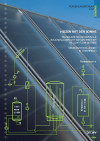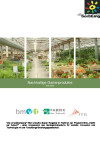Suchergebnisse für "Factsheet: Energietechnologien gestalten, die für alle sinnvoll und nutzbar sind"
Heizen Mit Der Sonne

Teilsolare Raumheizung & Solaranlagen mit Schichtspeicher im Low Flow Betrieb Neue Entwicklungen in Österreich
Forschungsforum
2/1997
Herausgeber: BMVIT
Deutsch, 6 Seiten
Downloads zur Publikation
Sustainable Housing - Services creating individual and social advantages

Contemporary sustainable solutions for residential building will be optimised and realized by interdisciplinary planning orientated to the life-cycle services supporting the quality of life and intelligent use of information and communication technologies.
Sustainable product service for raising the energy efficiency of injection moulding machines for plastics
Performing a feasibility study of establishing a sustainable product service for raising the energy efficiency of injection moulding machines for plastics via analysing the basic organizational and technical conditions.
Self-discharge mechanisms in the vanadium redox battery
The Vanadium Redox Battery is an attractive solution to uninterrupted power supply applications. The battery is very robust and easy to use and an overall efficieny of >85% would be achieveable under conditions when self-discharge is minimized.
IEA EBC Annex 81: Data-Driven Smart Buildings
The latest developments in digitization have the potential to significantly reduce the costs of building operations. The annex is intended to improve access to low-cost, high-quality data from buildings and to support the development of data-driven energy efficiency applications and analyses. This enables the optimization of building controls in real time and offers energy efficiency data and decision support for building managers.
ÖkoInform - Platform for Exchange of Information in Green Building

A platform for the exchange of information to promote the better integration of ecological materials and renewable resources in the research programme "Building of Tomorrow"
Innovation and Sustainability in the Construction and Housing Sector
Concepts for enhancing in-house innovation in construction; development of performance and benchmarking indicators in the housing sector. Economic proposals to improve legal and structural business environment and to increase sustainable and energy efficient construction and renovation activities.
Gas supply by local mircro grids
Proof of the technical and economic feasibility of the utilization of fermentation gas from agricultural fermentation gas facilities by means of local micro grids.
Green SandboxBuilder - Regulatory sandboxes in the field of sustainable construction and renovation
In the "Green SandboxBuilder" project, for the first time in Austria, the need for regulatory sandboxes for ecologically sustainable and climate-effective projects in the building sector had been systematically explored. The implementation of regulatory sandboxes in the Austrian construction sector can contribute to decisively accelerating the introduction of technological, procedural and social innovations and thus to achieving the sustainability goals.
Plus Energy Melk - Path for the realization of Plus-Energy-Districs in Melk
The city of Melk has set itself the goal of playing a pioneering role in renewable energy supply and climate protection. In this context, an initiative aimed at implementing Positive Energy Districts. Two urban development projects are currently underway to examine under which framework conditions, technical and organisational solutions Positive Energy Districts can be realised. A proactive participation process aims at informing developers and investors as well as other stakeholders about the realization of PlusEnergy concepts.
Ratgeber: Nachhaltige Gartenprodukte

Herausgeber: "die umweltberatung"
Deutsch, 26 Seiten
Downloads zur Publikation
Energy package Kolpinghaus / Eco-Suite Hotel
The Kolping association’s dormitory for pupils and students has been extended. The energy demand of the newly constructed Eco-Suite Hotel is minimized by use of highly efficient components (such as LED lighting). Locally available energy sources (waste water heat and sunlight) are used and an on-site energy system is being created for the use of the heat energy surplus. Guests at Eco-Suite Hotel can experience life in a plus energy building.
Webinar: EBC Technical Day - Energy innovations for the city of tomorrow
June 24th 2020
Online
The Webinar highlighted activities of the IEA TCP ”Energy in Buildings and Communities” (EBC) as well as results from Austrian R&D projects funded within the Austrian research and technology programme “City of Tomorrow”.
Homeservices by the company of tomorrow
Sustainable services in co-operation with the housing sector will be investigated, their effects on environment, employment, acceptance by consumers, hindrances as well as prerequisites for sustainable facility management and a new positioning of concierge systems analysed.
Architecturally Diverse, Energetic Renewal

Post War Modernist Buildings Under Monument Protection. A Comparative Analysis of Energy Efficient Renewal Case study: Open Air School Franklinstrasse, Wien 21
IEA DHC Annex TS4: Digitalisation of District Heating and Cooling
The aim of the IEA DHC Annex TS4 is to identify the possibilities of digitalization and the integration of digital process for district heating and cooling. To this end, the Annex TS4 establishes a platform for industrial and scientific experts to strengthen international cooperation and networking and the exchange of experience of national research and development activities.
urban pv+geotherm - Innovative concepts for the supply of large volume buildings/ quarters with PV and geothermal energy
The use of renewable energies in inner city locations is mostly linked to higher costs andconsidered as problematic. The aim of this project was to optimize (cost and energy) heating (and where required, cooling) using geothermic and photovoltaic for an urban, densely-built development area. With the project´s findings it will be easier to ecologically and economically plan the use of renewable energies especially in urban areas.
Digital Twin / Building Tracker - Coupling of building simulation with a physical building in real time
The goal of the project ist o couple an office building during operation with its virtual twin, the "building tracker", which will be developed and applied for the first time within the project. Thanks to coupling of monitoring and simulation, innovative building energy management of nearly zero-energy building is possible.
ERA-NET COFUND Smart Cities and Communities (2014 - 2019)
Smart Cities and Communities have been identified as key to achieving the energy efficiency targets for 2020 and 2050. The main objective of this ERA-NET COFUND is to stimulate successful practice and facilitate replicability within Smart Cities and Communities implementation projects and also across projects in order to achieve a technological shift in the current energy system and provide smart and integrated solutions for technology, government and society.
IEA - Advanced Motor Fuels Technology Collaboration Programme (AMF-TCP)
The AMF Technology Collaboration Programme’s (AMF-TCP) vision is that advanced motor fuels, applicable to all modes of transport, significantly contribute to a sustainable society around the globe. The mission of AMF is to advance the understanding and appreciation of the potential of advanced motor fuels toward transport sustainability. We provide sound scientific information and technology assessments facilitating informed and science-based decisions regarding advanced motor fuels on all levels of decision-making.
